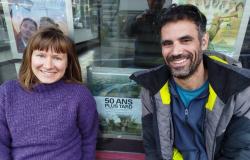1889. Since the Jules Ferry laws, which came into force a few years earlier, primary school has become compulsory, secular and free. Consequently, recruitment of teachers has increased almost everywhere in the country. Trailing behind her a heavy past as a communarde, Louise Violet, in her fifties, barely obtains permission to teach and is one of these new black hussars sent to the countryside to educate the youth. Once in post, however, she realizes that her presence is neither expected nor desired, and that everything remains to be undertaken: the arrangement of the class, as well as prospecting among families whose children are still massively busy at school. work of the land.
Doubtful, at first, not to say hostile, the mayor of the village will little by little fall under the charm of the teacher and prove to be an indispensable ally for her…
The republican school facing the peasantry
With his new film Louise Violetreleased in theaters on November 6, director Eric Besnard immerses us with interest in the issues and problems of the Third Republic; an era of change, marked by the social consequences of three revolutions and a crushing defeat against Prussia in 1870. The strengthening of the capitalist bourgeoisie, of course, is the most concrete manifestation of this change in society, with the bringing into line of a working class in the big cities, and the corollary beginnings of the rural exodus, marking the planned end of our French peasantry. The era, this film with its naturalistic flavor tells us, is above all that of the adoption of strong social measures, such as secular and compulsory schooling, with a view to preparing the free men of tomorrow, perfect servants of the Republic – a political interference in the education of children to which the peasants, traditionally distrustful of the State, were naturally resistant, especially since the excesses of the Terror in 1792.
Subtle, benevolent, the director addresses this climate of mistrust without falling too far into demonstration or Manichaeism. Let us nevertheless point out that, contrary to what the latter asserts, school was already free before the Jules Ferry laws, so much so that 80% of children were in school from 1872. But teaching was largely held by people of 'Church, something unacceptable for Republicans…
Finely written, the film is carried by talented actors, including Grégory Gadebois, who collaborates for the third time with Eric Besnard (after the very questionable Délicieux et Simple Things), and Alexandra Lamy, who here plays a totally unexpected role, far from the eruptive characters to which the cinema has confined her. Louise Violet also offers some magnificent shots of Haute-Loire and Puy de Dôme, attesting to the filmmaker's real concern for the setting.
A film that echoes our times?
Just as interesting as his work itself is the primary motivation that drives Eric Besnard: “Our Republic united around secularism is under attack, our society is increasingly communitarian and victimized. I wanted to show where we come from, who we are, and that it wasn’t easy to get there.” How, when reading such comments, can we not think of the religious obscurantism which regularly threatens schools, notably through the Samuel Paty and Dominique Bernard affairs? Let us all the same object, if necessary, that neither the peasants nor the village priests of the end of the 19th century have ever represented a danger for teachers comparable to that of the Islamists today.
3 stars out of 5
Print, save this article as PDF

![[CINEMA] Louise Violet: the glory of the black hussars of the Republic](https://euro.dayfr.com/temp/resized/medium_2024-11-22-6f31cde77f.jpg)




